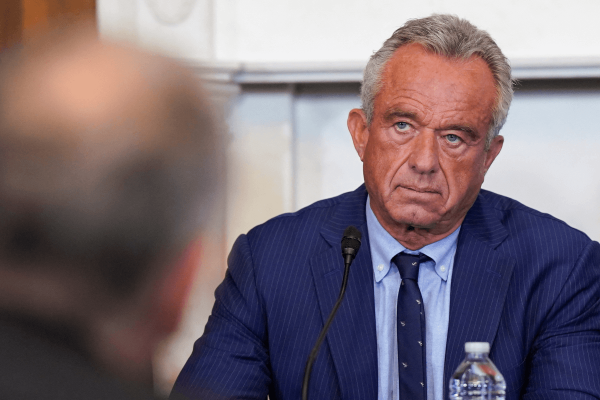This interview is part of The Reconstruct, a weekly newsletter from Sojourners. In a world where so much needs to change, Mitchell Atencio and Josiah R. Daniels interview people who have faith in a new future and are working toward repair. Subscribe here.
I've grown tired of this question: “How do we get young people to come to church?”
Yes, I know that 49% of Americans born in the 1940s or earlier attend religious services at least once a month. And yes, I know that when it comes to my ilk, people born in the 1990s or 2000s, that percentage cuts in half. Those numbers don’t scare me.
Likely, younger generations are repelled by the homophobic, xenophobic, and nationalistic forms of Christianity presented to them. And maybe, the old ways of measuring religiosity can’t capture the spirituality of generations cultivated by Google and sequestered by COVID-19. But that’s an article for another time.
Because while How do we get young people in the pews? may be the question the American church has been hyper-fixated on, those already seated aren’t getting any younger. Which poses a more urgent question: How do we care for the aging church? How do we love those who are still in the pews—or those who would like to be, if degenerative cognitive diseases weren’t keeping them at home?
This is a question of both professional and theological interest to Benjamin Mast, a clinical geropsychologist and a professor at the University of Louisville. He is the author of many books, including Second Forgetting: Remembering the Power of the Gospel during Alzheimer’s Disease. I spoke with him about how Christians can better care for both dementia patients and their caregivers, what scripture has to say about remembrance, and how people with Alzheimer’s and dementia minister to those of us without memory loss.
This interview has been edited for length and clarity.
Jenna Barnett, Sojourners: At what point in your research and in just your professional life, did you start thinking about the intersection of dementia and spirituality?
Benjamin Mast: I’d written one book that had been published more for clinicians on how to integrate person-centered perspectives into diagnostic procedures and care planning. And after that happened, I wanted to write a book about living optimally or as well as you can with dementia—a book written more for people with a diagnosis and for their family caregivers, because most of the care, as you know, is done by families. And as I started to write a little bit about that, I realized that I couldn't genuinely do that without integrating a faith perspective, just in terms of my own belief.
The issues of memory and forgetting [present] not only practical questions, but also spiritual questions. And when you start to read scripture with an eye toward remembering and forgetting, you see that it’s everywhere. Old Testament, New Testament, God’s call to remember his past faithfulness, his presence in the here and now, and promises for the future. You see that quite a bit in the Old Testament and also in the new. The more I read and the more I thought on this, the more I saw this as a rich opportunity to explore, what does it mean to be a human? What does it mean to be a person of faith? And what does it mean to remember the Lord when you have a disease that causes very severe forgetting?
If I am a person of faith, and I get to a point in the progression of dementia that I can no longer remember my faith, what does that mean for me? What does that mean for my life? And what does it mean for my soul?
What sort of answers did you try to present? Especially to your question of “How do you remember the Lord when forgetting is your new reality?”
There’s multiple facets to this. What does it mean to remember the Lord? What’s the function of that? Is [the invocation to remember the Lord] a warning that carries a punishment, or is it a call, an invitation to remember the Lord to experience peace and comfort and grace in the midst of confusion and suffering?
For people who are living with Alzheimer’s disease, certain aspects of memory are affected more than others. Short-term memory loss is often the most affected, but remembering through things like music that are sort of over-learned in the context of faith traditions—old songs and hymns—are also aspects of remembering, both corporately and on one’s own.
People can have great difficulty remembering names and conversations and appointments, medications and bills, but they’ll remember “Amazing Grace” or “The Old Rugged Cross” word for word. And in a sense, that’s one answer to the call to remember the Lord and to experience the peace and grace that comes through a spared memory system. People respond well to common Bible passages that they maybe memorized many years ago. So, sitting with a person and reading through Psalm 23, for example, that’s much more likely to be recalled—to prompt an older memory system that’s less affected by Alzheimer’s disease.
The other side of it is when we think about the Alzheimer’s or dementia experience, it’s not only about the person who has the disease, but also family members and people who are close to them. And so there, the call to remember is a bit more general… We encourage family members to rehearse people’s life stories, their stories of faith. That can be an activity that’s shared with the person who has Alzheimer’s disease. In a time that’s usually characterized by a lot of confusion, anxiety, and fear, this can ground their identity.
What you’re trying to do is move away from relying only on these short-term memory systems where you show up and you ask a person, “How are you doing? What have you done today? What did you have for breakfast?” All of those things are really very difficult for a person with Alzheimer’s disease to remember. But in terms of thinking about these calls to remember the Lord, how to help people remember, we try to rely on some of these spared memory systems: emotional memory, memory for things that were memorized many years ago, things that have been repeated often over time. You’re going to where people are stronger rather than where they’re weaker.
When you talk about rehearsing a life story, are you suggesting caregivers write one down? Or are you suggesting more of a regular practice of going over some of these points together?
It can be done in a variety of ways. I think the practice is not done necessarily only to help people remember, but to offer them a source of comfort and grounding. Sometimes when this is happening, the person helping with the life reviews, often a family member, they’ll fall into almost like a quiz show kind of thing: Do you remember when this happened? Do you remember when that happened? Starting any conversation with a person with Alzheimer’s disease with “Do you remember?” is not the greatest starting point, because that’s an area of weakness for them. What you’re trying to do is lovingly remind them of their story, remind them of things about them that are true and meaningful.
READ MORE: My Year With Alzheimer's
One woman told me about the big decision to move her mom from her home into a nursing home. And she had promised her she’d never do that to her, but eventually her mom’s care needs outstripped what she could offer. And that happens. It’s always a dangerous promise to make. She had a lot of guilt about this. But one of the things she didn’t realize was that part of this process of transitioning her mom to a nursing home was that she was going to have to go through all of her stuff and decide what to keep and what to get rid of. As she got into it, she found this as an opportunity to remind her mother of who she was and what was important to her. So, as she was going through boxes, she found pictures, her marriage certificate, poems that she had written, scripture she had written out, and put all of this together in books and brought them to her mother. And it didn’t require anything of her mother other than just to page through it. She could see her mother responding to this. To me, that’s a great example of how you can step in and say, OK, I am going to do something that might help this person experience the comfort of even momentarily remembering this aspect of their story.
That’s really beautiful. And it also makes me think about how, with dementia and Alzheimer’s, obviously, the person with the disease has the forgetting, but also the caregivers can forget who the person was before the diagnosis. So, I could see how forming that scrapbook would be helpful to the caregiver as well.
When a person develops dementia, there’s a lot of fear and anxiety. And if the person shows any sort of personality change or any sort of behavioral issues, oftentimes families need that reminder, right? This person has changed, but it’s still the person that you love and care for. And those grounding reminders can be really helpful as you try to take care of them. Because it’s hard.
On a practical level, what are some ways you think that the church can better care for people who have Alzheimer’s and for those who are caring for them?
I really appreciate asking the question. Just be willing to journey with the person and the family. People who had been part of a church community or church family found it harder to attend services once the dementia set in. And they essentially felt like they were forgotten. The family caregivers say that my mom or dad or my partner was part of the church community for years. They were in the choir, maybe they were a deacon. They served so many people. And then when it came their turn to be cared for, when they could no longer show up at the building, it was like they were forgotten—out of sight, out of mind.
I think things are changing, but there’s still quite a bit of stigma surrounding Alzheimer’s and dementia. People start to feel very marginalized. And one of the biggest things a church community can do is find ways to show up and be present, to listen for needs that they could help fill. Sometimes those are spiritual needs. Sometimes they’re just basic physical and social needs. Somebody could bring a meal. Somebody could sit with the person who has dementia while a caregiver goes out to run some errands. It really starts with presence.
And that’s tricky because Alzheimer’s is different than cancer, right? It affects your ability to interact. And so sometimes people kind of hold back, not knowing where to start. That’s why I think the other thing churches can do is offer more education about Alzheimer’s and dementia. You don’t need to know a lot of technical details to know how to interact and have a conversation with somebody.
There are a few things to avoid. Like I said, don’t start with, ”Do you remember me?” or ”Do you know who I am?” Just enter into conversation by asking about how they’re doing, maybe sharing something that’s going on with your life. Share a memory with that person, bring some food. When you’re alone and isolated like that, even a short visit is like a cup of cool water in the midst of the hot desert. And maybe it doesn’t cure everything that’s happening. In fact, we know it doesn’t. But that’s a small sacrifice that you can make in terms of stepping in.
And what about in the earlier stages of dementia, when the person can still go to the church service? Are there ways to make the service itself more inclusive or accessible?
Yeah, that’s a great question. And in fact, as the diagnosis moves earlier and earlier, we’re going to start seeing people who have a diagnosis of Alzheimer’s disease but have very mild cognitive changes. So, they’re probably already there at the church service, and they’re going to interact with other people and the overall service just like everybody else there, but they’re going to be more forgetful.
There is a broader movement that doesn’t have a lot of traction yet, to think about dementia-friendly churches. How do we design the space in a way that’s friendlier for a person who has memory issues? How stimulating is the environment? A very loud service, a very flashy service, and a very busy one are going to be much harder to navigate for a person who has memory issues. Some church congregations have things set up in a way that naturally would work well. Others will start to think about if they should have a separate service for people who have these types of memory issues. Obviously, that’s a size issue. It’s a big undertaking for a lot of churches.
The more people know about Alzheimer’s disease, the more they know that they have one, two, maybe 10 people in their congregation who have Alzheimer’s disease. That is actually something that can make it quite a bit more dementia-friendly. Then there are people who understand the person and are willing to be with them to help them navigate some of these issues.
That makes a lot of sense. The last time I went with my late maternal grandmother to a church service was on a Mother’s Day, and it was my mom, my grandmother, and me. For a lot of the service, it was very comforting to my grandmother. But then she did get overwhelmed at one point. So, my mom went and helped her in the restroom. And at some point, my grandmother got agitated. I was feeling self-conscious that we could hear the agitation from the sanctuary. And I was beginning to worry that we were being disruptive. And I remember a person in the pew behind me just put her hand on my shoulder and said, “Hey, it’s OK. Don’t worry about this.” That was such a comfort to me, and I was so thankful that that woman knew what was going on. So, I think you’re right that education is important for parishioners. It’s not just the ones leading the service.
Church can be a space where things out of the ordinary happen, or people say and do things that are unexpected. If people have a sense of at least the context of why that might be happening, I think they’re much more understanding. And so that person took a small step to just say, “Hey, this is OK here.” And I think that’s a beautiful vision for our churches: We can accept this. We can accommodate this and embrace this.
Also, the church isn’t just what happens at the building. The church is a community. And so sometimes we need to bring the church to people through visitation. I always wish I was a better singer because I’ve seen people go to visit with somebody, and sing some of those old hymns. A well-known passage, a well-known song, sharing communion together, praying the Lord’s Prayer, that can be the most beautiful service, even if it’s just two or three people.
I do like the idea, though, of several choir members coming with their robes to someone’s house. Well, we’ve been talking about how we can minister to those with dementia, and I’m wondering if there are ways that you’ve seen folks with dementia minister to those of us who do not have it.
Yes, I have. I think sometimes in our faith, we get so caught up in our heads that we sort of miss out on some of the beautiful simplicity. And one of the things that I’ve been surprised about when I visit with somebody who has dementia and their family, is that oftentimes, the family caregiver will ask the person with dementia if they want to pray to conclude the meeting. And some of those prayers just have such an amazing simplicity to them. One man decided he wanted to pray for me. I thought I was there to pray for him. And I recall he said, “Help him to hold on to you when everything else is slipping away.”
And I thought, wow, what a prayer for somebody who is experiencing that.
I was doing a training at a church in Florida that’s actually got quite a bit of a dementia ministry going. And one woman came up afterwards and wanted to talk to me about how she felt like she was essentially discipled into faith by a neighbor who had early-stage Alzheimer’s disease. Whenever he saw her out walking, he would always come out [of his house], and kind of in a repetitive way, say he was always praying for her. His faithfulness, the way he was so consistent in checking in on her and saying he was praying for her, really moved her heart to consider what she believed.
I appreciate the question because sometimes we think, well, it’s about what we give to the person who has memory loss or confusion. And we sometimes forget that they have things that they can offer us as well. Just because you have a neurodegenerative condition doesn’t mean you’re not a human who can love and care and show grace to another person. But we have to slow down and pay attention to it. If we’re in a rush, we’re going to miss it.
“The more people know about Alzheimer’s disease, the more they know that they have one, two, maybe 10 people in their congregation who have Alzheimer’s disease.”
Got something to say about what you're reading? We value your feedback!






